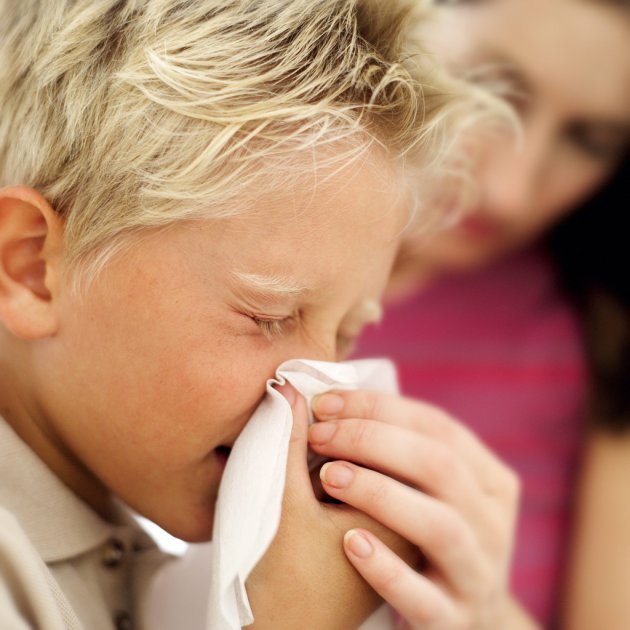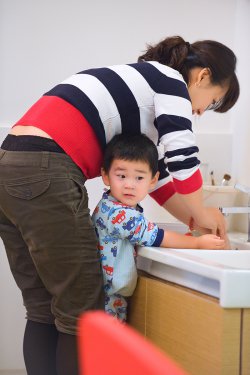Prevention: Win the War Against Germs

By Mary A Drobnak
Coughs and sneezes spread diseases! Nurse Mary offers her top tips in stopping germs from spreading during flu season
Summer is coming to an end, school is back in swing and the weather will soon be getting cooler bringing more of us back indoors. That means cold and flu season is about to begin! And it doesn’t take an expert to tell you that the main way germs get to circulate in communities during the autumn and winter months is through our close proximity to each other everyday in schools, offices, malls and gyms, making these environments breeding grounds for germs to spread.
We know small children have some germy habits such as putting their fingers, toys or objects in their mouths, not covering their mouths when they sneeze or cough and forgetting to wash their hands. However, adults suffer from some of these bad habits too! This is why it is essential to remind your children and yourself to practice germ fighting habits so that they become the norm in your daily routine.
Fact is that most illnesses can be avoided. Colds, the flu and other forms of bacteria and viruses spread from person to person, making prevention the key to a healthy body and environment. Following some simple and basic guidelines can decrease your risk of infection and help keep you and your child healthy during this cold and flu season.
Check your child’s immunisation records
Are your children up to date on all standard immunisations? Are you? Remember standard vaccinations are essential to building life long immunity against preventable disease/illnesses and stengthening the immune systems. Also, many international clinics offer the seasonal flu vaccine in Shanghai and because flu-season may begin as early as October and last until May, the best time to get vaccinated is in October or November.
Refrain from touching your face often
A very common way germs are spread is through our hands when we touch objects, introducing germs to our eyes, ears, nose and mouths. We do not realise how often we touch our face, but during the day it has been estimated that we touch ten potentially germy objects a minute and touch our faces every three minutes! The  best defense against germs is to limit the amount of times we touch our faces and if we must do so, use the back of our hands, which come in contact with the least amount of germs.
best defense against germs is to limit the amount of times we touch our faces and if we must do so, use the back of our hands, which come in contact with the least amount of germs.
Take care washing your hands
Rule of thumb is to wash your hands often using soap and warm water, scrubbing all over the front and back of the hands, in between fingers and around nails for 20 seconds and always after using the bathroom, before eating and drinking and before and after touching our eyes, ears, mouth or nose. In the absence of soap and water, a hand sanitiser with at least 60 percent alcohol is a decent substitute. During cold and flu season it is recommended to carry a hand sanitiser with you and to use it often, especially after being in public places until you can get to a source with soap and water.
Germ etiquette
One simple rule of germ etiquette is covering our mouths when we sneeze or cough, preferably into a tissue or our sleeve or elbow, not our hands. Also on the etiquette list is staying away from people who are sick (coughing and sneezing), and if that person is you, staying away from others so as not to spread your germs!
Don't share!
With younger children, it may be difficult to avoid sharing books and toys in the classroom. Remind your child to wash their hands afterwards and avoid touching their ears, eyes, mouth, or nose until they do. Absolute no-no’s in the sharing department (adults included) are drinks and foods, and lipstick or lip balms. These are major sources of germ spreaders as are facial cosmetics, razors, communal tubs of creams, and lotions, bars of soap, locker-room towels, brushes, combs and helmets.
Be aware of the top germ spots
Bathrooms, toilets, light switches, countertops, doorknobs and all handles, toys, remote controls, keyboards, dish and hand towels, pillows, sheets (i.e. anything that is communally touched) are targets for germs. These should be cleaned with disinfectants often to avoid exposure to germs. At school and at the office be sure to use individual use items such as paper towels and small paper cups. Many schools and offices may not have enough items to help maintain a healthy environment, so consider donating some pump soap, a hand sanitiser or disinfectant and encourage others to supply a box of tissues and bacterial wipes to raise awareness and build up your classroom or office supply.
Remember, lower your risk of being exposed to harmful germs by washing your hands often, creating a clean germ free environment, covering your mouth when you cough or sneeze and staying home when you are sick. And keep yourself healthy by drinking lots of water, eating healthy foods, and getting enough exercise and the right amount of sleep. This boosts your immune system and helps your body fight germs during the cold and flu season. Stay healthy and win the fight against germs!
Send Nurse Mary your health questions and concerns at [email protected]
